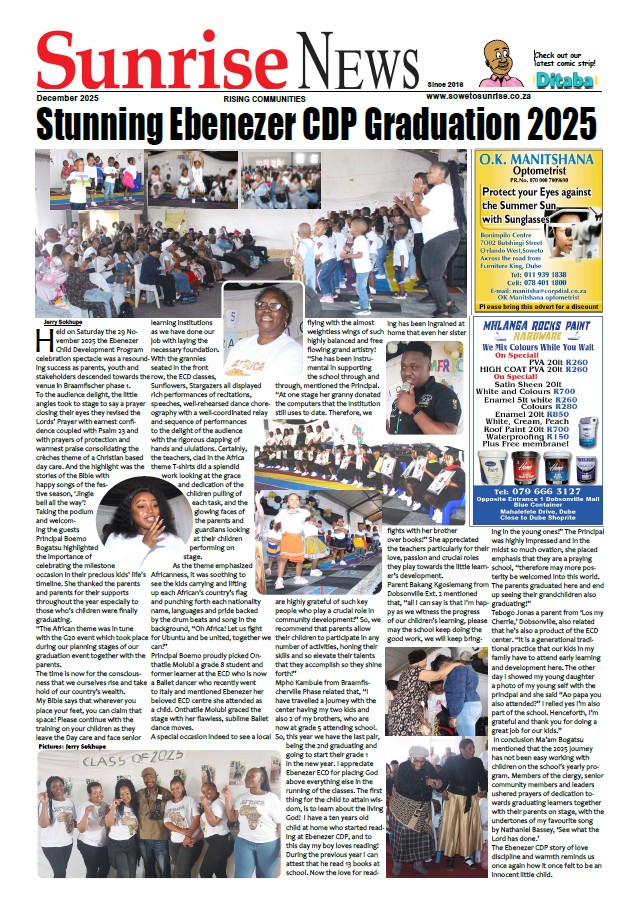Experts share advice on regaining post-holiday control of your money
The holiday season, is a time marked by family gatherings, travel, feasts, and often, a bit of over-indulgence. In fact, data from FNB recently revealed that most South Africans, in the lead-up to and during the Easter period, tend to spend more on general shopping, flights, accommodation, home DIY, restaurants, and clothing and apparel. But the numbers can add up quickly and, when the celebrations wind down, the reality of overspending can hit hard.
“Reality (after a heightened period of shopping and spending) can feel like a financial hangover. When the excitement of the season wears off, you might ask yourself ‘Why did I spend so much money?’, followed by a flurry of physical symptoms such as self-blame, guilt and self-isolation brought on by the shame of your new-found financial situation of being further in debt,” says FNB Retail Collections executive head Patricia Temba.
While these feelings of regret are normal, it’s important to quickly move to a space of self-empathy and use them as a springboard for action and corrective measures to ensure that you can regain control of your finances and effectively manage your money moving forward. That’s why experts at FNB Integrated Advice and FNB Collections have collated a series of invaluable tips to help you regain control of your finances and actively manage your debt in the weeks following Easter.
- Acknowledge the season’s impact on your finances
During holiday periods like Easter, it’s common for many to feel social pressure to spend on travel, buy gifts or host family, even when money is tight. That said, remember that it’s also possible to find a way back to a more balanced financial situation. “Creating memories that matter is normal and so is the financial cost that often comes with that. As a financial institution we understand that spending time with family is incredibly important, so we don’t look at this from a judgmental point of view. In fact, we want to support our customers by walking them back as they rebuild their financial confidence,” adds Temba.
- Assess your financial situation
When assessing your financial situation, it can be tempting to look the other way and choose denial of your financial situation by avoiding looking at your bank balance or opening your bills. However, your ability to face your post-holiday reality head-on can mean the difference between drowning in debt and coming out of your situation in a better position. “List everything, including your debts, monthly obligations, and upcoming expenses,” says Lethukuthula Ngcobo, Product Manager at FNB Integrated Advice. “Realise that clarity is empowering. Seeing it all in front of you might seem scary at first, but it’s equally important as it gives you a concrete lay of the land and helps to kick your brain into problem-solving mode.”
- Prioritise and budget
What you want to avoid, now that the holiday high is over, is continuing to make bad decisions with your money. You don’t want to put yourself into further debt just because you’re trying to stay afloat. And, now that you know what you’re working with in relation to your upcoming financial obligations, budgeting can bring you a much-needed sense of calm and control. “Plot out your essential expenses against your income,” adds Ngcobo. “Distinguishing between your needs and wants will help you prioritise critical items such as rent, utilities, groceries, and minimum debt repayments. Once those are covered, you can use your remaining income to gradually pay down your higher-interest debt.”
- Steer clear of new debt
“It can be tempting to dip into tools like credit cards, and personal loans to make-up for your financial short falls after a high-spend period. However, this will likely only lead you into a spiral of debt that is harder to break. As such, financial discipline is critical as it will help you set the foundation for longer-term stability” says Temba.
“To help yourself pause all non-essential spending and steer clear of taking on any new unnecessary debt, ask yourself, ‘Can I afford this?’ or ‘Am I willing to take on more debt to bring me more financial pressure in the long run?’ says Ngcobo, adding that tiny mindset shift can help you curb stress-induced emotional spending in the moment.
- Contact your creditors early
Most people erroneously delay proactively reaching out to their creditors when they are struggling. However, sitting around and merely hoping that things will improve is often not the best approach. “Not talking to your creditor or financial institution can, in fact, lead to penalties and default listings. At FNB we want to help you avoid this altogether – that’s why we sincerely encourage you to reach out to us the moment you suspect that you might have trouble meeting your financial obligations. Give us a call and we’ll see how we can help you – including exploring payment plans that suit your circumstances – but reaching out early is key,” says Temba.
Additionally, Ngcobo believes that due to the deeply psychological nature of money matters, feelings of shame and fear of judgment leaves many to keep their financial issues to themselves. “If you’re feeling overwhelmed, it’s even more important to speak to your lender. You’ll find that contacting your financial institution and explaining your situation will feel more like a relief than a confrontation. There’s no shame in reaching out because we’re here to offer solutions not obstacles.”
- Use free tech tools at your fingertips
Using a combination of human and technological help can go a long way in helping you turn your post-holiday financial situation around. “At FNB, we want to help consumers manage their money better, by empowering them with the intuitive tools like nav» Money on our banking app. It offers a myriad of resources like coaching through videos, podcasts, and practical tools to help you budget, set spend limits and scheduled payments, track your spend, and even keep an eye on your credit score.”
“Bouncing back from a period of heightened spending requires sobriety of thought, concrete support, empathy for oneself, and quick action to turn the situation around. And, at FNB we’re committed to helping our customers navigate their financial circumstances and walk them back to a path of financial stability,” concludes Ngcobo.
Soweto Sunrise News

































